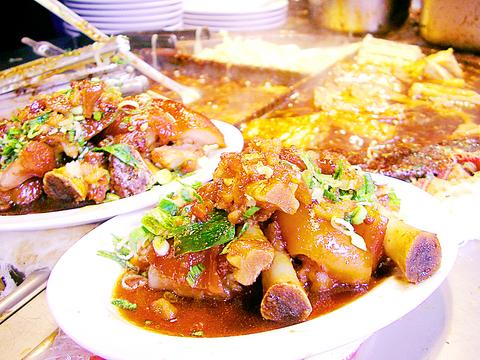Fu Pa Wang means "rich king" in Chinese, but maybe it's more appropriate to call this restaurant the "rich king of pork." It specializes in stewed pork, particularly pig's knuckle and pig's feet. Walking in the vicinity, you can smell the pork cooking long before you reach the restaurant.
It is necessary to arrive at the restaurant at the right time in order to get the restaurant's most popular dish -- pork shank -- which sells rapidly after lunch or dinner service begins. Because of the small size of the restaurant, (just nine tables), it is always full and queuing is almost inevitable. More than 120kg of pork is consumed in this small restaurant every day.
At the front of the restaurant, almost extending into the street, there are two giant pots in which meat is constantly stewing, stimulating your appetite even before you enter.

PHOTO: YU SEN-LUN, TAIPEI TIMES
According to owner Hsieh Tiao-lung (謝調龍), the pork needs to be stewed for four hours. And when serving, the sliced meat or knuckle is placed on small plates, garnished with sauce and chopped garlic shoots. The shoots are less spicy than garlic cloves but give out a light spicy fragrance that compliments the juicy meat and smooth fat and tendon.
The stewed pork is divided into three categories. The most popular, and the quickest to sell out, is pork shank (NT$80), which contains mainly lean meat with a minimum of fat and bone. The second is the knuckle (NT$50). This part has a higher proportion of tendon, making it smoother and more gelatinous. The third kind of meat is a challenge for gluttons, because it's the pure pig feet (NT$50), largely made up of tendon and fat, but for pig's feet lovers, this is the best stuff.
The restaurant offers many side dishes including stewed bamboo shoots, bean curd, egg and bitter melon all stewed in a soy-based thick sauce. An order for one vegetable side dish with pork and a bowl of rice or soup will come to around NT$100.
"My original idea was to recreate the old-time Taiwanese taste I remember from when I was small," Hsieh said. The intention to preserve the old Taiwanese feeling is also reflected in the decor, with wooden tables, long benches, and pottery decorations on the wall. The down side is you can't really sit around and ruminate on the delicious food, for there will always be people waiting for your seat.
Address: 20, Lane 115, Nanking E. Rd., Sec. 2, Taipei (台北市南京東路2段115巷20號)
Telephone: (02) 2507-1918
Open: 11:30am to 8pm
Average meal: NT$120
Details: Chinese menu only. Credit cards not accepted

On April 26, The Lancet published a letter from two doctors at Taichung-based China Medical University Hospital (CMUH) warning that “Taiwan’s Health Care System is on the Brink of Collapse.” The authors said that “Years of policy inaction and mismanagement of resources have led to the National Health Insurance system operating under unsustainable conditions.” The pushback was immediate. Errors in the paper were quickly identified and publicized, to discredit the authors (the hospital apologized). CNA reported that CMUH said the letter described Taiwan in 2021 as having 62 nurses per 10,000 people, when the correct number was 78 nurses per 10,000

As we live longer, our risk of cognitive impairment is increasing. How can we delay the onset of symptoms? Do we have to give up every indulgence or can small changes make a difference? We asked neurologists for tips on how to keep our brains healthy for life. TAKE CARE OF YOUR HEALTH “All of the sensible things that apply to bodily health apply to brain health,” says Suzanne O’Sullivan, a consultant in neurology at the National Hospital for Neurology and Neurosurgery in London, and the author of The Age of Diagnosis. “When you’re 20, you can get away with absolute

May 5 to May 11 What started out as friction between Taiwanese students at Taichung First High School and a Japanese head cook escalated dramatically over the first two weeks of May 1927. It began on April 30 when the cook’s wife knew that lotus starch used in that night’s dinner had rat feces in it, but failed to inform staff until the meal was already prepared. The students believed that her silence was intentional, and filed a complaint. The school’s Japanese administrators sided with the cook’s family, dismissing the students as troublemakers and clamping down on their freedoms — with

As Donald Trump’s executive order in March led to the shuttering of Voice of America (VOA) — the global broadcaster whose roots date back to the fight against Nazi propaganda — he quickly attracted support from figures not used to aligning themselves with any US administration. Trump had ordered the US Agency for Global Media, the federal agency that funds VOA and other groups promoting independent journalism overseas, to be “eliminated to the maximum extent consistent with applicable law.” The decision suddenly halted programming in 49 languages to more than 425 million people. In Moscow, Margarita Simonyan, the hardline editor-in-chief of the